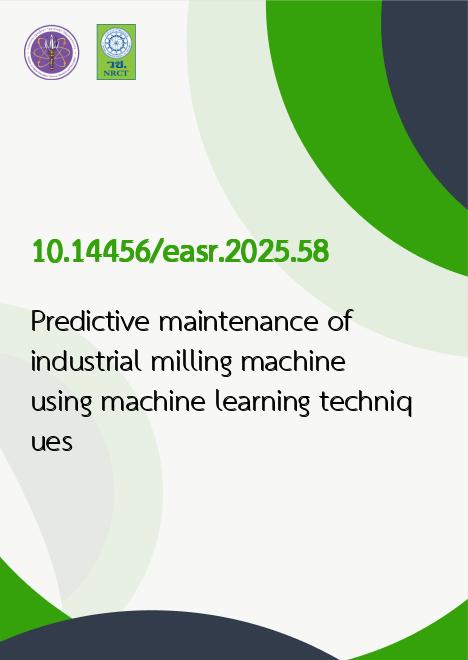
|
Predictive maintenance of industrial milling machine using machine learning techniques |
|---|---|
| รหัสดีโอไอ | |
| Creator | Subraya Krishna Bhat |
| Title | Predictive maintenance of industrial milling machine using machine learning techniques |
| Contributor | G Divya Deepak |
| Publisher | Faculty of Engineering, Khon Kaen University |
| Publication Year | 2568 |
| Journal Title | Engineering and Applied Science Research |
| Journal Vol. | 52 |
| Journal No. | 6 |
| Page no. | 636-647 |
| Keyword | Artificial neural network, Machine learning, Predictive maintenance, Decision tree, Industry 4.0 |
| URL Website | https://ph01.tci-thaijo.org/index.php/easr/index |
| Website title | Engineering and Applied Science Research |
| ISSN | 2539-6161 |
| Abstract | Condition-based predictive maintenance of industrial machinery is a key area of research in the present world looking towards Industry 4.0. Machine learning (ML) techniques can have tremendous impact in this aspect because of their robust predictive modeling capabilities. The present paper aims to determine the optimized machine learning technique for the predictive maintenance of an industrial milling machine. The data pertaining to the operating parameters and the failure types of the machine is obtained from a public dataset with 10,000 data points. Five of the most popular classification ML algorithms namely, Artificial Neural Network (ANN), Discriminant Analysis (DA), Naïve Bayes (NB), Support Vector Machine (SVM) and Decision Tree (DT) techniques are implemented for the dataset to determine their optimized hyperparameters for an effective prediction of the machine failure type. DT and ANN were found to be the two best techniques with overall accuracy of 99.15% and 98.8%, respectively, and superior performance metrics of Precision, Recall and F-Measure compared to the other models. The results obtained from the present study may be enriched in the future by incorporating deep learning-based models and hybrid ML and intelligent optimization techniques for effective predictive maintenance of various industrial systems. The present approach can thus be employed in real-time factory settings to realize the targets of Smart Manufacturing and Industry 4.0. |